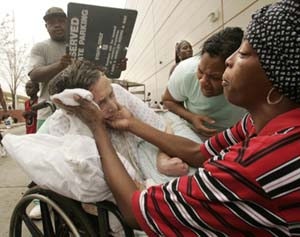lead article
Democrats, Republicans cover up
responsibility for Gulf Coast disaster
Working people take own initiatives to confront social catastrophe

|
Reuters/Rick Wilking
|
Working people outside the New Orleans Convention Center September 1 try to keep alive Dorothy Divic, 89. Lacking proper medical care, she died later that day.
|
BY ARGIRIS MALAPANIS
Democratic and Republican government officials, from Louisiana to Washington, are blaming each other for the catastrophe along the Gulf Coast in order to cover up the responsibility of both parties for the social disaster they imposed on hundreds of thousands in the region.
At the same time, the U.S. rulers are taking advantage of the Gulf Coast disaster to further their efforts to legitimize the use of the U.S. military in domestic operations, including “law enforcement.” In the latest factional finger-pointing among Democrats and Republicans, now focused on the response to Hurricane Katrina, politicians from both parties have pushed for making natural disasters and “civil disorder” a military matter for the federal government, not primarily a police matter.
Faced with inadequate or no government aid, working people affected by the storm have been taking initiatives to confront the social catastrophe themselves. This includes efforts to get jobs, rejecting being shipped from shelters out to sea on cruise ships, and helping neighbors during evacuation (see articles on this page and centerspread).
Appearing on the September 4 ABC TV show “This Week,” U.S. senator Mary Landrieu, a Democrat from Louisiana, said of President George Bush, “I might have to punch him—literally,” if he or members of his administration made one more disparaging remark about the response by local authorities to Hurricane Katrina. Those officials include relatives of the senator, such as Louisiana lieutenant governor Mitch Landrieu, her brother, and father Moon Landrieu, former mayor of New Orleans and housing and urban development secretary under James Carter. The senator also blamed Bush for neglecting the New Orleans levees, and demanded that he stop using the disaster for “photo-ops.”
Despite complaints by Louisiana and New Orleans Democrats of underfunding, however, the state of Louisiana had received $2 billion over the last five years from the Bush administration for Army Corps of Engineers civil projects—more than any other state. Only a tiny portion of these funds were used to reinforce the levee system, however, which was not designed to withstand a storm with the force of Katrina.
Louisiana governor Kathleen Blanco has also accused the Bush administration of not moving fast enough to send troops to the state in Katrina’s wake. The White House initially relied on National Guard troops sent to the region, now numbering 46,000, which are under the jurisdiction of state governors. According to the September 9 Washington Post, Blanco resisted a Bush administration effort to exert federal control over all local police and state National Guard units.
The Bush administration itself and its backers are claiming that it could not deploy federal troops rapidly into a situation where they would have to enforce “law and order” against “looters” because the Posse Comitatus Act of 1878 forbids use of the military for domestic policing. The Gulf Coast disaster is now being used by both Democrats and Republicans to argue for greater use of troops within the United States.
An editorial in the September 12 Army Times argued that “civil order broke down so quickly” outside the New Orleans Superdome, where tens of thousands sought refuge, because National Guard troops on the scene did not have firearms until September 2, some 72 hours after the hurricane slammed into the area. “Setting up an immediate and armed demonstration of authority was essential to establishing conditions for rescue and relief operations,” it said.
“The question raised by the Katrina fiasco,” said an article in the September 9 Wall Street Journal, “is whether the threat from madmen and nature is now sufficiently huge in its potential horror and unacceptable loss that we should modify existing jurisdictional authority to give the Pentagon functional first-responder status.”
By September 2, the Pentagon dispatched 27,000 troops to the Gulf Coast region and put their operations under the jurisdiction of the Northern Command, which was initiated under Clinton and established in Bush’s first term to direct the use of U.S. troops inside the United States. On September 9, Bush named Vice Admiral Thad Allen of the Coast Guard to oversee relief efforts. Allen replaced Michael Brown, the head of the Federal Emergency Management Agency (FEMA), in that responsibility. Three days later, Brown resigned from FEMA.
Given the revulsion by working people to initial acts of inhuman treatment by cops, military officials have been careful in shaping rules of engagement for troops on the scene. The soldiers are to use empty magazines in rifles during routine operations, cannot insert live rounds unless ordered, and have to aim to wound, rather than kill, when firing.
Related articles:
New Orleans: workers explain their resistance to evacuation by cops, troops
U.S. gov’t snubs Cuba’s offer to send doctors to Gulf Coast
How workers in battle transform themselves
Working-class response to Gulf Coast disaster
Hurricane evacuees in Houston reject being shipped out to sea
How cops obstructed evacuation
Shelters: shoddy conditions for evacuees
Workers displaced by Katrina seek union jobs
|



